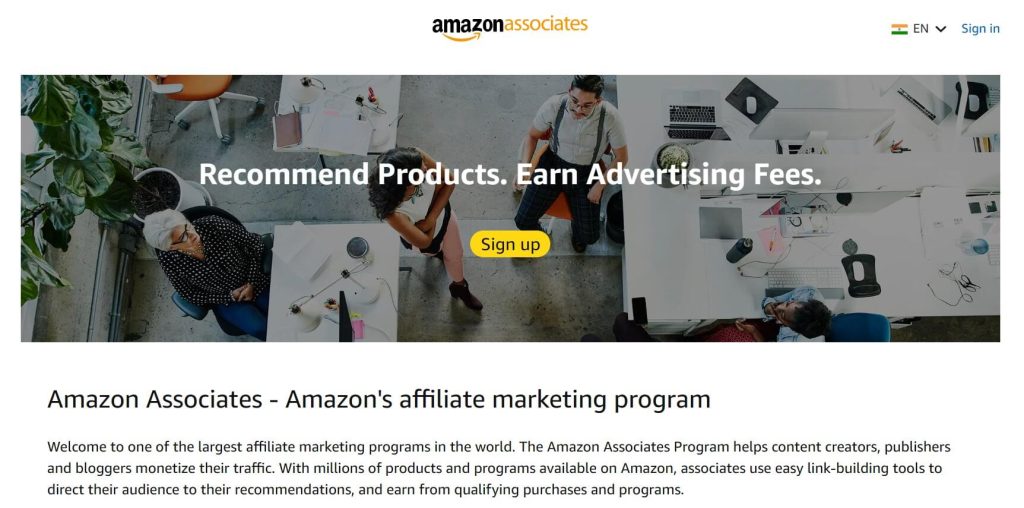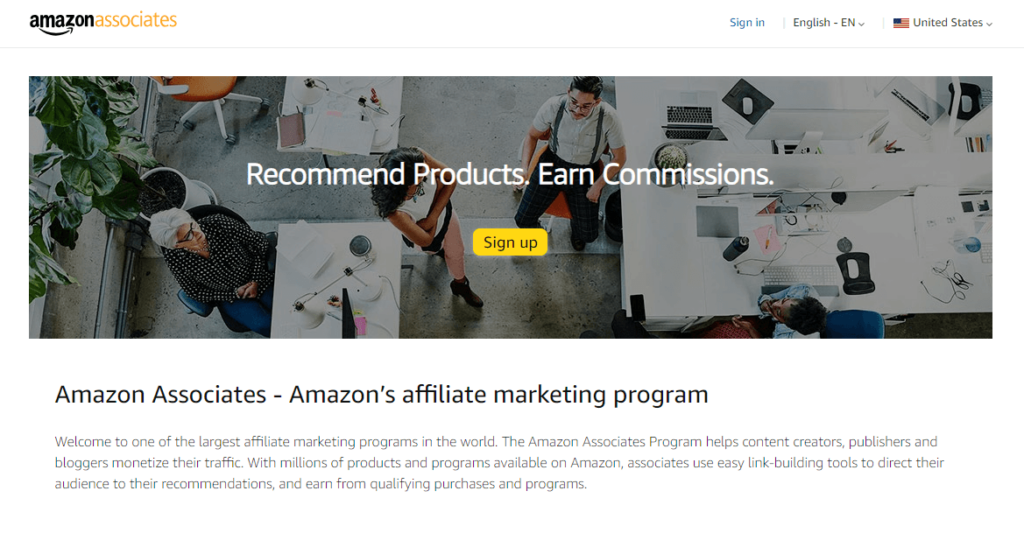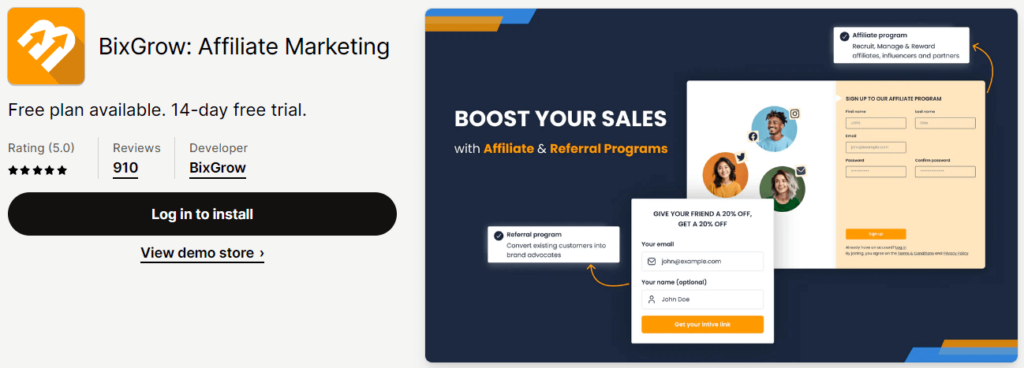Affiliate marketing is an effective way to grow a business. It allows companies to reach new customers by partnering with affiliates who promote their products. Since businesses only pay for results, the main benefits of affiliate marketing for business include low risk and high rewards.
It’s low-risk but high reward. You get more people to know about your brand, and your sales go up.

What is affiliate marketing?
In Affiliate marketing, affiliates will get rewarded with commissions for sales they drive, such as via clicks on designated links. Through this performance-based model, businesses pay affiliates solely for successful sales, resulting in a cost-effective marketing approach.
Here’s how it work
- A Business Creates an Affiliate Program
- Affiliates Promote the Affiliate Links
- Customers Click the Affiliate Links
- Customers Make a Purchase
- Affiliate Earns a Commission
Affiliate marketing works effectively because it helps merchants grow sales without upfront costs. Instead of paying for ads, merchants only pay commissions when affiliates bring in customers. This model reduces risk and increases ROI. Plus, affiliates create content that builds trust, attracting buyers naturally. That’s why businesses of all sizes use affiliate marketing to scale efficiently.
Affiliate marketing delivers the highest ROI compared to other marketing strategies, making it the top option for businesses at all size.
Benefits of affiliate marketing are for both parties. In this model, businesses gaining sales while affiliates earn commissions. Globally, Authority Hacker estimated that the affiliate marketing industry is worth $17 billion and an average affiliate marketer earns over $8000 monthly.
A great example of affiliate program is Amazon Associates, one of the largest affiliate programs globally. Bloggers, YouTubers, and influencers use their unique Amazon links to recommend products.

9 Benefits of Affiliate Marketing for Business
There are pros of affiliate marketing that make it a significant place in the modern business, here are reasons.
1. High cost-effectiveness
One of the biggest benefits of affiliate marketing is that it offer higher ROI rate. You only pay affiliates when they generate sales or leads, minimizing upfront costs and maximizing return on investment (ROI). Compared to traditional marketing, affiliate marketing advantages with around 4 times cost-effectiveness. This makes it particularly attractive for startups and businesses with limited marketing budgets.
- The average ROI for affiliate marketing campaigns is 13:1. This means for every $1 spent on affiliate marketing, businesses see an average return of $13.
- Additionally, 81% of advertisers consider their affiliate marketing programs to be either successful or very successful.
2. Reaching New Audiences and Expanding Reach
Affiliates, especially micro-influencers and niche bloggers, often have established communities and loyal followings. Partnering with them allows you to tap into new audiences you might not have reached through your marketing efforts, expanding your reach and brand awareness.
Influencer Marketing Hub (2023) State of Influencer Marketing Report that over 85% of marketers tend to use influencer marketing, with affiliate marketing being the most common type of collaboration.
Additionally, micro-influencers (with 10,000-50,000 followers) have been found to drive higher engagement rates than larger influencers.
3. Enhanced Brand Credibility and Trust
Affiliates who genuinely believe in and use your product act as brand advocates. Their positive recommendations and reviews build trust with potential customers, making them more likely to convert. This can be especially valuable for new or lesser-known brands.
Nielsen’s Global Trust in Advertising Report that consumers are 92% more likely to trust recommendations from friends and family than traditional advertising. Affiliate marketing leverages this trust through authentic recommendations from trusted sources.
4. Valuable Data and Insights
Affiliate programs advantage you by providing detailed performance data on clicks, conversions, and customer demographics. This valuable information helps you understand your target audience better, optimize your marketing campaigns, and improve product offerings.
All affiliate programs provide detailed performance data to their affiliates, including clicks, conversions, and customer demographics. These data can be invaluable for understanding target audiences and optimizing marketing campaigns.
5. Low Maintenance
Setting up and managing an affiliate program requires less effort than traditional marketing campaigns. Affiliates handle much of the promotion, allowing you to focus on other aspects of your business. Additionally, you can easily scale your program up or down based on your needs and budget.
We estimate that setting up an affiliate program take less than 30 mins for SMEs, and could also take few weeks for bigger companies. Additionally, affiliate programs can be easily scaled up or down based on budget and needs.
6. Diverse Marketing Strategies
Affiliate marketing offers a wide range of strategies to choose from, such as product reviews, blog posts, social media promotions, and influencer partnerships. This allows you to tailor your approach to specific audiences and marketing channels.
We identify various popular affiliate marketing strategies, including product reviews (63%), blog posts (58%), social media promotions (52%), and influencer partnerships (47%).
7. Flexibility and Adaptability
Another pro of Affiliate marketing is that it be adapted to fit various business models and industries. Whether you sell physical products, digital downloads, or even services, there’s likely an affiliate marketing strategy that brings huge advantages.
Insider Intelligence Affiliate Marketing Statistics shows that affiliate marketing is used across various industries, with the top categories being retail, travel, finance, and education. This demonstrates the flexibility and adaptability of the channel.
8. Long-term Relationship Building
Affiliate marketing fosters long-term relationships with partners who share your brand values and target audience. This collaboration can lead to ongoing promotion and advocacy, even beyond individual campaigns.
Affiliates who consider their relationships with merchants to be “strong” or “very strong,” indicating long-term partnerships tend to benefit more from the brand.
In some cases, programs offer recurring commissions, incentivizing ongoing promotion and advocacy from affiliates beyond individual campaigns.
9. Continuous Improvement
Through ongoing analysis of affiliate performance data and feedback, you can continuously refine your marketing strategies, products, and overall business approach, leading to sustainable growth and success.
Via affiliate networks just like Awin or CJ Network, marketers can track affiliate marketing performance data, allowing for continuous improvement of strategies and offerings based on real-time insights.
Examples of big companies using affiliate marketing
Over 80% of companies deploy affiliate programs, and massive companies like Amazon and Shopify are no exceptions. Affiliate marketing plays a crucial role in their success in maintaining their dominance
Let’s delve into how these titans leverage this strategy and the results they achieve.
1. Amazon Associates Program

Amazon is an American “The Everything Store” founded by Jeff Bezos in 1994. Amazon initially started as an online marketplace for books but gradually expanded into various product categories, specializing in e-commerce.
The Amazon Associates Program is an affiliate marketing program. Anyone with a website, blog, or social media account (including platforms like TikTok and YouTube) is welcome to apply.
Today, their program is the house of nearly 1 million active affiliates, forming a global promotional army. Affiliate marketing is stimulated to contribute over 10% of Amazon’s online sales – a staggering testament to its effectiveness.
Amazon typically offers a commission rate ranging from 4% to 10% depending on the product category, but can be up to 20% in specific cases.
2. Shopify Affiliate Program

Shopify is a leading ecommerce software platform that enables individuals and businesses of all sizes to sell products online.
With a subscription-based business model, Shopify has earned substantial revenue, totaling $4.8 billion in the most recent financial year, making it the world’s second-largest ecommerce platform.
The Shopify Affiliate Marketing Program allows affiliates to create new entrepreneurs while earning more than just commission.
They right now work with thousands of active affiliates, forming a vibrant community of entrepreneurs promoting entrepreneurship.
The current commission rate is 20% of the first month’s subscription fee for each referred merchant. With Shopify s subscription plans ranging from $29 to $2,000 monthly, their affiliate can earn $58 for each referral on average.
So, there you have it! Even giants like Amazon and Shopify use affiliate marketing to reach new customers, boost sales, and grow their businesses.
And it’s not just for big companies – a small business can especially benefit from their own affiliate program with hundreds of bucks of starting cost.
How much do you spend on affiliate marketing?
Unfortunately, there’s no one-size-fits-all answer to how much you should spend on affiliate management costs, as it depends heavily on various factors specific to your program and business: Program size and complexity, internal resources, software and tools, performance-based expenses (bonuses and reward)
Industry benchmarks on initial affiliate marketing expense:
- Percentage of revenue: Allocating 5-10% of your affiliate program’s revenue to management costs.
- Industry averages: Some studies indicate the average cost per acquisition (CPA) for affiliate marketing falls around $15-$30.
- Affiliate network fees: Can range from a one-time setup fee to monthly subscription charges and commission overrides (typically 30% of affiliate commissions). However, there are free affiliate networks.
- Affiliate software: Monthly fees can vary based on features and usage, ranging from $50-$500+.
- Creative development: Costs depend on the complexity of creatives (banners, landing pages, etc.) and whether you outsource them. If you are a small-medium business, these costs are not significant.
In short, every company can start its affiliate program with less than $5,000.
Those above are just starting expenses. The maintenance expenses may vary significantly, depending on the business scale.
For example, the cost of affiliate marketing can be significantly lower for online-based businesses, especially with production-free models like dropshipping.
For instance, for a medium-sized Shopify owner, the cost typically ranges from $180 to $1200 per year, or $15-$100 monthly. You can technically deploy a zero-cost affiliate program but with many limits.
The best approach is to create a flexible budget that adapts to your program’s performance and growth.
Regularly check your ROI to assess the effectiveness of your affiliate management spending and adjust your strategy as needed.
Are you overpaying for affiliate marketing?
So, there are advantages and benefits of affiliate marketing. But may cost a lot time and money to manage a program. Hence, a suitable affiliate marketing app will simplify this process. With features for tracking sales, creating links, and gaining valuable marketing insights, BixGrow empowers you to optimize your affiliate campaigns and maximize your earnings potential.

What’s more?
We have solutions to deploy your affiliate programs at any budget.
Despite the competitive landscape, the BixGrow app continues to exhibit strong growth trends, with a 5/5 stars average rate and 6,000 users.
You can literally get a full-package service with just $20 – or a half of your lunch.